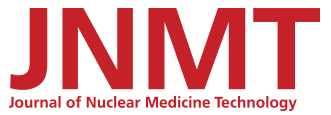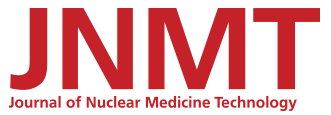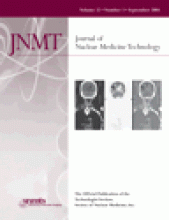
This will be my last report as the chair of the NMTCB, so I would like to take this opportunity to applaud all of the directors on the Board who devote endless hours of their time to serving our members and our profession. The NMTCB has certified over 23,000 nuclear medicine technologists since its inception, and we currently have over 17,000 active members. Over the last 7 years, the NMTCB has seen an increase of approximately 49% in the number of candidates taking the entry-level exams, from 671 in 1996 to 1327 in 2003. In response to requests from the professional community, the NMTCB has also provided our members with opportunities to sit for specialty exams in nuclear cardiology and PET. The Board was able to create high quality exams for both of these areas in an expedient manner, and both exams continue to perform well. The Board has also approved new policies regarding continuing education and disciplinary procedures. These policies were mailed to all members in the summer and are available on the NMTCB Web site at www.nmtcb.org. All of this has lead to increased work for the volunteers on the Board of Directors and the staff in the office, but the NMTCB is committed to our mission, and we continue to provide high-quality service to our members.
Kathy Thomas, MHA, CNMT, FSNMTS, will begin her term as chair at the beginning of October. She has spent many, many hours coordinating the creation of the PET exam, which is scheduled for its first administration on September 18. The deadline for the submission of an application to take the exam in 2004 has passed, but keep an eye on the NMTCB Web site for the announcement of the application deadline date for 2005. The eligibility requirements and a detailed content outline can be found on the NMTCB Web site as well. Kathy Thomas addressed several questions related to the PET exam in the May/June 2004 edition of Uptake in her article entitled “PET Specialty Exam Raises Questions.” The NMTCB is also participating in open dialogue with the leadership of the SNMTS regarding the PET exam as well as the possibility of the creation of an advanced practice exam.
The following policy on the number of times that an individual can attempt to pass the entry-level exam has been approved by the Board of Directors and will take effect on January 1, 2005. When an examinee fails the entry-level exam, the following rules apply:
After the first failure, the examinee may apply to retake the exam as soon as 2 weeks after the date of the first failure.
After a second failure, the examinee must wait 6 months between exam dates.
After a third failure, the examinee must document 15 hours of continuing education in each of the following subject areas: radiopharmacy, instrumentation, and radiation safety. The examinee may then go through the 3 steps above again (i.e., 3 additional attempts to pass the exam).
After a total of 6 unsuccessful attempts to pass the exam, the examinee must successfully complete an approved nuclear medicine technology training program to become eligible to retake the exam.
In April 2004 the NMTCB adopted the SNMTS Code of Ethics, which can be found on the SNM Web site at www.snm.org/SNMTSCode and on the NMTCB Web site under Resources. All certificants and applicants are expected to abide by the ethical principles contained in this document, effective January 1, 2005. The Code of Ethics and the disciplinary policy were adopted in an attempt to encourage the safe and ethical practice of nuclear medicine technology.
The Nuclear Cardiology Specialty exam was administered at LaserGrade, Inc., sites across the country on Saturday, August 14, 2004. Watch the NMTCB web site for the date of the 2005 administration. Candidates are strongly encouraged to use the detailed content outline as a guide when preparing for this exam. The SNMTS provided a suggested bibliography for individuals who are interested in taking this exam in the May/June 2004 issue of Uptake. We are frequently asked to provide a list of study aids, but the NMTCB is unable to recommend any references or study materials due to conflict of interest issues.
The NMTCB is increasing its participation in meetings that are related to the practice of nuclear medicine technology. The NMTCB has always attended the SNM meetings, and will continue to do so, but we will also be increasing our participation at other meetings. The SNMTS invited the NMTCB to send a representative to the Conference of Radiation Control Program Director’ National Symposium on Fusion Imaging and Multimodality Technical and Regulatory Considerations in February of 2004. Kathy Thomas, chair-elect of the NMTCB, attended. In March the Board of Directors decided to join the Health Professions Network and to send representatives to the meetings of the Association of Educators in Radiologic Sciences, the American Healthcare Radiology Administrators, and the Alliance for Quality Medical Imaging and Radiation Therapy.
Finally, the NMTCB is currently pursuing accreditation from the National Commission on Certifying Agencies for the entry-level exam. This accreditation will enable the NMTCB to be recognized as a qualified credentialing organization for nuclear medicine technology if the Consumer’s Assurance of Radiologic Excellence (CARE) Act now before Congress is passed.
Footnotes
As always, please feel free to contact me at kmurphy{at}gwcc.commnet.edu if you have any questions, suggestions, or comments.







